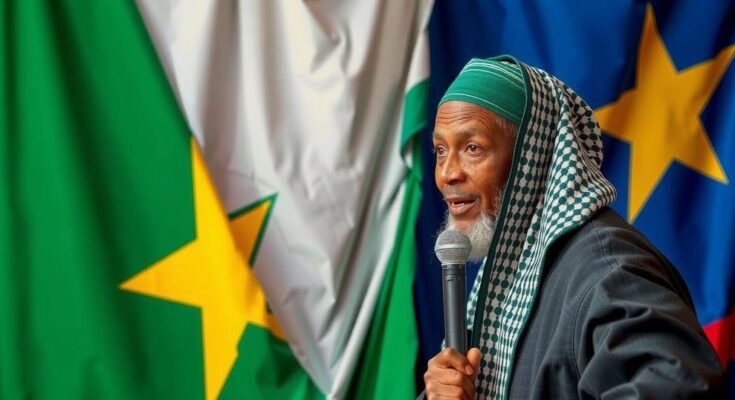Lt. Gen. Abdel Fattah El Burhan visited South Sudan to address crucial bilateral issues amidst escalating military tensions and economic challenges, particularly concerning the oil pipeline critical to both nations. His visit is significant in light of Sudan’s governance crisis and internal conflicts within South Sudan’s political structure.
Lt. Gen. Abdel Fattah El Burhan, the head of Sudan’s Sovereignty Council and commander-in-chief of the Sudanese Armed Forces (SAF), visited Juba, South Sudan, to engage in discussions concerning critical bilateral issues. This marks his third official visit to South Sudan since the onset of conflict between the SAF and Rapid Support Forces (RSF) in mid-April of the previous year. He was welcomed at Juba International Airport by South Sudan President Salva Kiir Mayardit and other Sudanese diplomats.
Accompanying El Burhan were several high-ranking officials, including the Minister of Energy and Oil, Mohyieddin Naeem, the undersecretary of the Ministry of Foreign Affairs, Ambassador Hussein El Amin, and the director-general of the General Intelligence Service, Lt. Gen. Ahmed Mufaddal. Notably, the visit was characterized as unannounced by South Sudanese journalist Ateem Simon.
The discussions between Sudan and South Sudan centered on four key issues impacting their relations, coinciding with escalating military tensions near the border, particularly in the oil-rich areas of Heglig, which both nations claim. Additionally, the dialogue addressed the challenges surrounding the pipeline that transports South Sudan’s crude oil to Bashayer Port in Sudan, which has been halted since February, significantly impacting both economies.
South Sudan, heavily reliant on oil for revenue, faces severe financial repercussions, losing approximately $100 million monthly, while Sudan suffers losses from transit fees. A high-level delegation from South Sudan recently visited Port Sudan to negotiate the resumption of oil exports, but delays have raised security concerns regarding the situation.
Furthermore, the visit aligns with remarks made by Taban Deng Gai, a vice president of South Sudan, suggesting that Sudan lacks a governing structure. This sentiment was officially disassociated from the South Sudanese government. Simon expects El Burhan to formally address these statements during his visit.
As the de facto guarantor of the revitalized South Sudan Peace Agreement, El Burhan’s visit could also be linked to internal disparities within the South Sudan Opposition Alliance (SSOA), which may require consultation with Sudan due to leadership changes. This follows a similar negotiation format seen in 2020, underscoring Sudan’s integral role in South Sudan’s political dynamics.
The geopolitical landscape in Sudan and South Sudan has been fraught with tension since South Sudan’s independence in 2011. Key issues include territorial disputes over resource-rich areas like Abyei and Heglig, ongoing military confrontations, and the critical reliance of South Sudan on oil exports through Sudanese infrastructure. The halting of oil exports poses economic threats, as both nations suffer financially. Furthermore, the Sudanese political situation remains unstable due to internal conflicts and the absence of effective governance, exacerbating challenges to regional stability.
In summary, Lt. Gen. El Burhan’s visit to South Sudan serves as a pivotal moment in addressing pressing bilateral concerns amidst ongoing military escalations and significant economic hardships due to oil transport issues. The complexities of Sudan’s governance and its role in South Sudan’s political agreements highlight the necessity for diplomatic engagement. Future collaboration appears essential for rebuilding the relations between the two nations.
Original Source: www.dabangasudan.org




